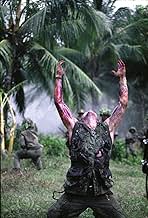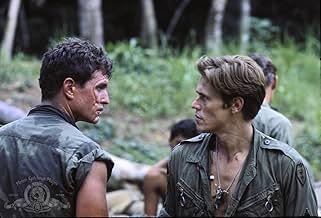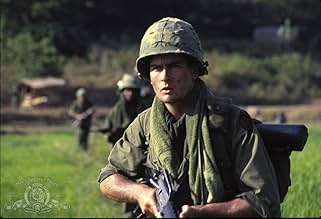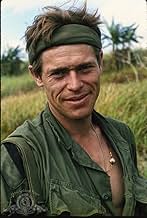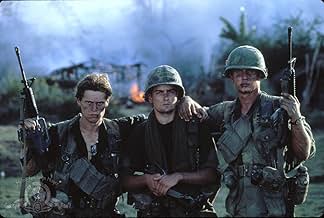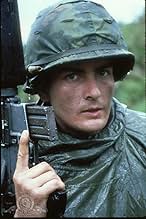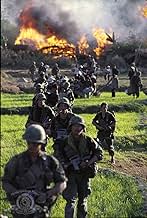Un jeune soldat au Vietnam traverse une crise morale lorsqu'il est confronté aux horreurs de la guerre et à la dualité de l'homme.Un jeune soldat au Vietnam traverse une crise morale lorsqu'il est confronté aux horreurs de la guerre et à la dualité de l'homme.Un jeune soldat au Vietnam traverse une crise morale lorsqu'il est confronté aux horreurs de la guerre et à la dualité de l'homme.
- Récompensé par 4 Oscars
- 24 victoires et 16 nominations au total
Résumé
Reviewers say 'Platoon' is acclaimed for its realistic Vietnam War portrayal, highlighting soldiers' moral and psychological struggles. Oliver Stone's veteran experience enhances authenticity. The film is lauded for its gritty style and strong performances by Willem Dafoe and Tom Berenger. However, some critics argue it oversimplifies moral issues and lacks historical accuracy. Its anti-war message is both praised and criticized for being simplistic and propagandistic. Despite mixed views on artistic merit, 'Platoon' is recognized for its emotional impact and resonance.
Avis à la une
It's September 1967, and Chris (Charlie Sheen) has just arrived in Vietnam. He is sheltered and his father and grandfather fought in the military. As the new guy, nobody cares to be his friend. Lt. Wolfe (Mark Moses) is a weak ineffective leader. His men are divided in two. Some are followers of the cruel Sgt. Barnes (Tom Berenger). Others are followers of the humane Sgt. Elias (Willem Dafoe). In the end, Barnes and Elias are in a struggle for Chris' soul.
This is the quintessential Vietnam war movie. Oliver Stone has recreated the jungle combat and placed a morality tale in the middle of it. It is possibly Charlie Sheen's greatest performance. His innocence at the beginning evolves into a grizzled veteran fighter. The combat is so realistic, and the story is so compelling. It is a must see for all movie goers.
This is the quintessential Vietnam war movie. Oliver Stone has recreated the jungle combat and placed a morality tale in the middle of it. It is possibly Charlie Sheen's greatest performance. His innocence at the beginning evolves into a grizzled veteran fighter. The combat is so realistic, and the story is so compelling. It is a must see for all movie goers.
Many great war films of the Vietnam conflict are centered around these themes of blurred morality and the uselessness of war, and Oliver Stone's Platoon is among the most well known. Stone, who wrote and directed the film and also served as an infantryman in Vietnam, first rose to fame for his war films that dramatized the infamous Cold War conflict. The main premise of his magnum opus are the inner conflicts within US forces deployed to southeast Asia, rather than the actual physical conflicts between them and the Communist-allied Vietnamese forces. More broadly, Platoon analyzes the "duality of man" concept that has been studied in numerous other works, from fellow Vietnam War films like Full Metal Jacket (1987) and Apocalypse Now (1979), all the way back to the latter's source material and inspiration in Joseph Conrad's Heart of Darkness.
Platoon focuses on the moral decay of soldiers in American units, and how this contributes to their inability to fight their Vietnamese enemies. Charlie Sheen sums up this theme with his on-the-nose voiceover, "We did not fight the enemy, we fought ourselves... and the enemy was in us."
Vietnam War-movies tend to be even harder to watch than most war flicks, as the lines between the "heroes" and "villains" are blurred more than in any other dramatized period of warfare in recent human history. In wars like World War II, which are widely known for being as black and white as military conflicts have become, the contrasting features between the heroic forces we are meant to root for and their opposing enemy platoons are well defined. That is almost never the case with the United States-North Vietnamese/Vietcong conflict in Vietnam during the overarching Cold War.
That is not to say that most wars throughout human history have not been many shades of grey, with the winners and losers not always corresponding with the righteous and evil. But because of the guerrilla nature and infamous legacy of the Vietnam War itself - namely, the immense public protest against American involvement - the Vietnam War remains by far the most unpopular war in modern American history. With that said, most of the film is fantastic, from the aforementioned narrative to the grim lightning of the southeast Asian jungles that emphasize the film's tone, to the poignant, melancholic score.
Platoon focuses on the moral decay of soldiers in American units, and how this contributes to their inability to fight their Vietnamese enemies. Charlie Sheen sums up this theme with his on-the-nose voiceover, "We did not fight the enemy, we fought ourselves... and the enemy was in us."
Vietnam War-movies tend to be even harder to watch than most war flicks, as the lines between the "heroes" and "villains" are blurred more than in any other dramatized period of warfare in recent human history. In wars like World War II, which are widely known for being as black and white as military conflicts have become, the contrasting features between the heroic forces we are meant to root for and their opposing enemy platoons are well defined. That is almost never the case with the United States-North Vietnamese/Vietcong conflict in Vietnam during the overarching Cold War.
That is not to say that most wars throughout human history have not been many shades of grey, with the winners and losers not always corresponding with the righteous and evil. But because of the guerrilla nature and infamous legacy of the Vietnam War itself - namely, the immense public protest against American involvement - the Vietnam War remains by far the most unpopular war in modern American history. With that said, most of the film is fantastic, from the aforementioned narrative to the grim lightning of the southeast Asian jungles that emphasize the film's tone, to the poignant, melancholic score.
Platoon is a 1986 American war film written and directed by Oliver Stone one of the most strongest realistic anti war films of all time. It is one of the best Vietnam war films I have ever seen that won the Academy Award for Best Picture of 1986 and best Director for Oliver Stone, as well as Best Sound Mixing and Best Film Editing. Stone's Vietnam film portrayed a real life human been on his point of view of the story telling that went on in his real life that he experienced after his tour of duty in Vietnam ended in 1968, Oliver Stone wrote a screenplay called Break: a semi-autobiographical account detailing his experiences and the life he was in Vietnam. The characters were portrayed more then a few soldiers they were portrayed more as a human been than been soldiers obeying an order.Platoon shows the Vietnam War was a big mistake, but being a fictional documentary on Vietnam is far from its purpose. It is one of my personal favorite war movies. I love this movie to death.
Those of us who did make it have an obligation to build again, to teach to others what we know, and to try with what's left of our lives to find a goodness and meaning in this life.
In Platoon, Chris Taylor (Charlie Sheen) is a young, naive U.S. soldier who, upon his arrival to Vietnam, quickly discovers that he must do battle not only with the Viet Cong, but also with the gnawing fear, physical exhaustion and intense anger growing within him. While his two commanding officers draw a fine line between the war they wage against the enemy and the one they fight with each other, the conflict, chaos and hatred permeate Taylor, suffocating his realities and numbing his feelings to man's highest value... life.
Chris sees his platoon fragmented into two halves, each aligned with one of two men -- Sgt. Elias (Willem Dafoe) and Sgt. Barnes (Tom Berenger). Those two soldiers are really two positive good things to see in the film because it sets the viewer on the seat of the edge. They both have nominally the same enemy (Viet Cong), but, really, it doesn't take long to realize that Elias is Good, and Barnes is Evil (the "enemy" does not enter into the moral equation of this film, at all it's an outside threat, same as malaria-carrying mosquitoes or even friendly fire). Elias feels the futility of the war and has respect for life; Barnes fights the war doggedly and has no compassion, period. Both are efficient soldiers fighting the same enemy, but really as is at one point aptly put by Chris Taylor himself,they are fighting for the souls of the platoon members, as the outcome of the war is never really in doubt.
The platoon reaches the village, where a food and weapons cache is discovered. While questioning the village chief, Barnes loses his patience and senselessly kills the man's wife despite his denials that they are aiding the Viet Cong. Barnes is about to murder the man's young daughter to force him to tell them to where the enemy is.
Elias doesn't take kindly to this kind of behavior. Elias and Barnes come closer and closer to open conflict, as Taylor becomes a veteran, obviously siding with Elias. Meanwhile, the fate of the platoon comes closer and closer to them, culminating in an explosively shot action conclusion. The end is dark, but morally satisfying.
Platoon is a legendary film. A film that I will always cherish, and a film that I will never get tired of. And the last Vietnam film worth a damn to watch. There isn't any War film today that was filmed as really human drama war today in 2015. It respectively represents the very essence of purposefully haunting powerful cinematography in the history.-- It is representing admirable cinematic craftsmanship and storytelling. A film that is sometimes impossible to watch for its frighteningly intense and emotionally draining account of the Vietnam War as it is waged both on the battlefields and within the very souls of men.
The best real human drama portrayed on screen anti-war film in Vietnam from the 80's, It is my favorite film that I will always love to death to see. I also don't watch this film for an action ; I actually see it for the war and how it everything was, what is more valuable and it is life: The film also have a message in it. The actors portraying the characters did make a believable performance as the real team of squad soldier fighting the Enemy the Viet Cong.
The battles with Viet-Cong are shown realistic mostly on the end of the final battle. 10/10
Those of us who did make it have an obligation to build again, to teach to others what we know, and to try with what's left of our lives to find a goodness and meaning in this life.
In Platoon, Chris Taylor (Charlie Sheen) is a young, naive U.S. soldier who, upon his arrival to Vietnam, quickly discovers that he must do battle not only with the Viet Cong, but also with the gnawing fear, physical exhaustion and intense anger growing within him. While his two commanding officers draw a fine line between the war they wage against the enemy and the one they fight with each other, the conflict, chaos and hatred permeate Taylor, suffocating his realities and numbing his feelings to man's highest value... life.
Chris sees his platoon fragmented into two halves, each aligned with one of two men -- Sgt. Elias (Willem Dafoe) and Sgt. Barnes (Tom Berenger). Those two soldiers are really two positive good things to see in the film because it sets the viewer on the seat of the edge. They both have nominally the same enemy (Viet Cong), but, really, it doesn't take long to realize that Elias is Good, and Barnes is Evil (the "enemy" does not enter into the moral equation of this film, at all it's an outside threat, same as malaria-carrying mosquitoes or even friendly fire). Elias feels the futility of the war and has respect for life; Barnes fights the war doggedly and has no compassion, period. Both are efficient soldiers fighting the same enemy, but really as is at one point aptly put by Chris Taylor himself,they are fighting for the souls of the platoon members, as the outcome of the war is never really in doubt.
The platoon reaches the village, where a food and weapons cache is discovered. While questioning the village chief, Barnes loses his patience and senselessly kills the man's wife despite his denials that they are aiding the Viet Cong. Barnes is about to murder the man's young daughter to force him to tell them to where the enemy is.
Elias doesn't take kindly to this kind of behavior. Elias and Barnes come closer and closer to open conflict, as Taylor becomes a veteran, obviously siding with Elias. Meanwhile, the fate of the platoon comes closer and closer to them, culminating in an explosively shot action conclusion. The end is dark, but morally satisfying.
Platoon is a legendary film. A film that I will always cherish, and a film that I will never get tired of. And the last Vietnam film worth a damn to watch. There isn't any War film today that was filmed as really human drama war today in 2015. It respectively represents the very essence of purposefully haunting powerful cinematography in the history.-- It is representing admirable cinematic craftsmanship and storytelling. A film that is sometimes impossible to watch for its frighteningly intense and emotionally draining account of the Vietnam War as it is waged both on the battlefields and within the very souls of men.
The best real human drama portrayed on screen anti-war film in Vietnam from the 80's, It is my favorite film that I will always love to death to see. I also don't watch this film for an action ; I actually see it for the war and how it everything was, what is more valuable and it is life: The film also have a message in it. The actors portraying the characters did make a believable performance as the real team of squad soldier fighting the Enemy the Viet Cong.
The battles with Viet-Cong are shown realistic mostly on the end of the final battle. 10/10
Platoon is generally regarded as one of the strongest anti-war films of all time. While this is certainly true, what's often overlooked -- at least after only one run through the film -- is that it's chiefly a tale of God vs. Satan, and the war is there to set a perilous backdrop. No doubt, Platoon shows the Vietnam War was a big mistake, but being a fictional documentary on Vietnam is far from its purpose.
The story is told from the point of view of Chris Taylor (solidly played by Charlie Sheen), a middle class kid who goes to Vietnam to do what he thinks is his patriotic duty. In the first ten minutes, Chris is shown in the uncomfortable jungle, struggling just to survive in the natural environment, let alone do any actual damage to the enemy. Quickly we're introduced to the well-known facets of the Vietnam War: The lack of sense of purpose, the wraith-like enemies, the obvious prevalence of the uneducated and poor among the fighting grunts -- and, soon, we see how these factors combine to cause widespread low morale and some actions of more than questionable ethical value.
Chris sees his platoon fragmented into two halves, each aligned with one of two men -- Sgt. Elias (Willem Dafoe) and Sgt. Barnes (Tom Berenger). These two really are the driving force behind the film. They both have nominally the same enemy (the Viet Cong), but, really, it doesn't take long to realize that Elias is Good, and Barnes is Evil (the "enemy" does not enter into the moral equation of this film, at all -- it's an outside threat, same as malaria-carrying mosquitoes or even friendly fire). I won't deny it is a very black-vesus-white relationship, but this polarity does not feel contrived. Elias feels the futility of the war and has respect for life; Barnes fights the war doggedly and has no compassion, period. Both are efficient soldiers fighting the same enemy, but really -- as is at one point aptly put by Chris Taylor himself -- they are fighting for the souls of the platoon members, as the outcome of the war is never really in doubt.
Elias/Barnes' hold on the platoon, and the viewer, is developed through several war sequences. A chilling scene takes place in a village, where our soldiers find no VC, but they do find a cache of VC weapons. The inhumanity of certain soldiers, including of Sgt. Barnes, is unflinchingly shown here. It leaves the viewer with an empty feeling that is hard to shake, reminding of the similarly empty look on a woman's face after she sees her son killed in front her.
Elias doesn't take kindly to this kind of behavior. Elias and Barnes come closer and closer to open conflict, as Taylor becomes a veteran, obviously siding with Elias. Meanwhile, the fate of the platoon comes closer and closer to them, culminating in an explosively shot action conclusion. The end is dark, but morally satisfying.
Don't watch this movie for the action. That's not to say it's not well shot, or unrealistic. On the contrary. It's quite convincing. But it doesn't show war as a fun sport, and it's never a question of good guys versus bad guys. There will be no cheering for the "good guys" or anyone else in this one. Stone succeeds brilliantly at putting the viewer into the middle of it all, and it's not a pretty sigh (and definitely not for the squeamish, either).
On the other hand, if you want great acting, it's here. Dafoe and Berenger do incredibly well, with the incredibly good (and seemingly authentically sounding) script. Barnes is horrific as he challenges three men to kill him, drinking hard liquor out of the bottle. They don't make a move, and neither will you, though you'll hate him just as much as them. Dafoe is a ray of light in the dark as Elias. The cast is rounded out with many characters, all well played, and adding another dimension to the film.
The technical aspects of the film are superb, though one never thinks about them much, as the movie is completely engrossing. The production values seem quite good, as well. The most stunning peripheral aspect of this film, however, is the music. It's emotional and draining, and used to great effect -- listen for the main theme as you watch the village burn.
Watch this one a few times, and you'll likely be quite moved each time. I'll be surprised if you give it less than what I gave it: 9/10
The story is told from the point of view of Chris Taylor (solidly played by Charlie Sheen), a middle class kid who goes to Vietnam to do what he thinks is his patriotic duty. In the first ten minutes, Chris is shown in the uncomfortable jungle, struggling just to survive in the natural environment, let alone do any actual damage to the enemy. Quickly we're introduced to the well-known facets of the Vietnam War: The lack of sense of purpose, the wraith-like enemies, the obvious prevalence of the uneducated and poor among the fighting grunts -- and, soon, we see how these factors combine to cause widespread low morale and some actions of more than questionable ethical value.
Chris sees his platoon fragmented into two halves, each aligned with one of two men -- Sgt. Elias (Willem Dafoe) and Sgt. Barnes (Tom Berenger). These two really are the driving force behind the film. They both have nominally the same enemy (the Viet Cong), but, really, it doesn't take long to realize that Elias is Good, and Barnes is Evil (the "enemy" does not enter into the moral equation of this film, at all -- it's an outside threat, same as malaria-carrying mosquitoes or even friendly fire). I won't deny it is a very black-vesus-white relationship, but this polarity does not feel contrived. Elias feels the futility of the war and has respect for life; Barnes fights the war doggedly and has no compassion, period. Both are efficient soldiers fighting the same enemy, but really -- as is at one point aptly put by Chris Taylor himself -- they are fighting for the souls of the platoon members, as the outcome of the war is never really in doubt.
Elias/Barnes' hold on the platoon, and the viewer, is developed through several war sequences. A chilling scene takes place in a village, where our soldiers find no VC, but they do find a cache of VC weapons. The inhumanity of certain soldiers, including of Sgt. Barnes, is unflinchingly shown here. It leaves the viewer with an empty feeling that is hard to shake, reminding of the similarly empty look on a woman's face after she sees her son killed in front her.
Elias doesn't take kindly to this kind of behavior. Elias and Barnes come closer and closer to open conflict, as Taylor becomes a veteran, obviously siding with Elias. Meanwhile, the fate of the platoon comes closer and closer to them, culminating in an explosively shot action conclusion. The end is dark, but morally satisfying.
Don't watch this movie for the action. That's not to say it's not well shot, or unrealistic. On the contrary. It's quite convincing. But it doesn't show war as a fun sport, and it's never a question of good guys versus bad guys. There will be no cheering for the "good guys" or anyone else in this one. Stone succeeds brilliantly at putting the viewer into the middle of it all, and it's not a pretty sigh (and definitely not for the squeamish, either).
On the other hand, if you want great acting, it's here. Dafoe and Berenger do incredibly well, with the incredibly good (and seemingly authentically sounding) script. Barnes is horrific as he challenges three men to kill him, drinking hard liquor out of the bottle. They don't make a move, and neither will you, though you'll hate him just as much as them. Dafoe is a ray of light in the dark as Elias. The cast is rounded out with many characters, all well played, and adding another dimension to the film.
The technical aspects of the film are superb, though one never thinks about them much, as the movie is completely engrossing. The production values seem quite good, as well. The most stunning peripheral aspect of this film, however, is the music. It's emotional and draining, and used to great effect -- listen for the main theme as you watch the village burn.
Watch this one a few times, and you'll likely be quite moved each time. I'll be surprised if you give it less than what I gave it: 9/10
This certainly rates as one of the best Vietnam films of all time. What I especially enjoyed was the realistic atmosphere of the film, entrenching the viewer into a world which seems surreal yet believable. Oliver Stone's real-life experience in Vietnam brought a gifted outlook to this film, one drawn by experience, not common Hollywood conventions. While this proved be a lesser film to the equally amazing Full Metal Jacket, it was not by much. The performances by Tom Berenger, Willem Dafoe, Charlie Sheen and John C. McGinley were exceptional, capturing the plight of the tortured soldiers.
Oscars Best Picture Winners, Ranked
Oscars Best Picture Winners, Ranked
See the complete list of Oscars Best Picture winners, ranked by IMDb ratings.
Le saviez-vous
- AnecdotesAccording to Oliver Stone, he intentionally cast Tom Berenger and Willem Dafoe against type. Berenger was mostly famous for playing good guys, while Dafoe had primarily played villains up until then. Both men received Oscar nominations for their work.
- GaffesWhen the men are playing cards, one of the men is looking at a Playboy from March 1971, despite the film taking place in 1967.
- Citations
[Refering to Vietnam]
Chris Taylor: Somebody once wrote, "Hell is the impossibility of reason." That's what this place feels like. Hell. I hate it already, and it's only been a week. Some goddamn week.
- Versions alternativesTV version has much of its dialogue redubbed and shots refilmed, replacing such lines as "He thinks he's Jesus F---in' Christ!" with "He thinks he's George Freakin' Washington!"
- ConnexionsEdited into A Tour of the Inferno: Revisiting 'Platoon' (2001)
- Bandes originalesAdagio for Strings
Written by Samuel Barber
Arranged and Conducted by Georges Delerue
Used by arrangement with G. Schirmer, Inc.
Meilleurs choix
Connectez-vous pour évaluer et suivre la liste de favoris afin de recevoir des recommandations personnalisées
Everything New on Prime Video in June
Everything New on Prime Video in June
Your guide to all the new movies and shows streaming on Prime Video in the US this month.
Détails
Box-office
- Budget
- 6 000 000 $US (estimé)
- Montant brut aux États-Unis et au Canada
- 138 530 565 $US
- Week-end de sortie aux États-Unis et au Canada
- 241 080 $US
- 21 déc. 1986
- Montant brut mondial
- 138 546 255 $US
- Durée2 heures
- Couleur
- Mixage
- Rapport de forme
- 1.85 : 1
Contribuer à cette page
Suggérer une modification ou ajouter du contenu manquant








